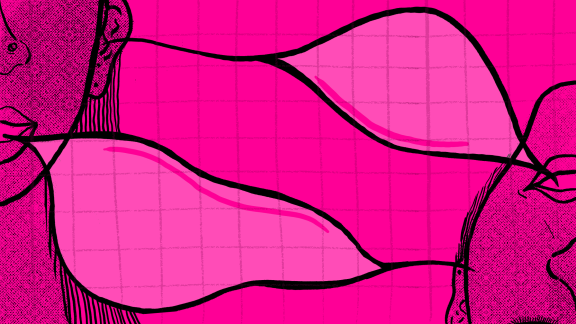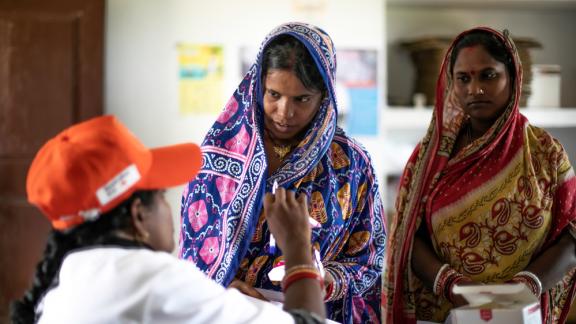Other people are other people. They’re not us.
When I was 19, one sultry evening in Hyderabad, I knocked at the door of my senior’s hostel room. She opened the door, leaned against it with her arms crossed, and said, ‘What do you want?’ The ‘you’ had that hint of warning and welcome, like the monsoon breeze’s anticipatory, even predatory hint of rain.
I was confident, even arrogant. But I was also shaking with nervousness. I said what I had come for (with much bashfulness and stammering) – ‘Will you have sex with me?’
I probably didn’t say it well. I may have even implied something about how, as a left-wing feminist-in-training, this was really something she should be interested in exploring. And here I stood, within arms reach. So why not?
She asked me to come inside, then said, ‘Have you ever done that before? Do you even know how?’ By ‘we’, I inferred that she meant two bodies that did not have a penis.
I was forced to admit, ‘No.’ Then, ‘But surely we can figure it out?’
The world stood on its head as she briefly considered this. She glanced at me appraisingly, then her table, laden with books and neatly hand-written papers.
‘No.’
I forgot my own newly acquired feminism enough to ask, ‘Why not?’
‘I have to finish this assignment. If at least you knew how, then — maybe. But this would take too much time. And I won’t have time to finish my assignment.’
Of course I had no idea about how to do any of this.
All I knew about lesbian sex was from the fleeting bits and pieces I had scoured and pieced together from libraries, pirated DVDs and the stray blog posts of a pre-Tumblr, pre-fanfiction era. How many afternoons had been spent just wandering around the streets, hoping for a hint of same-sex anything from this universe? Same-Sex Love in India (writings on same-sex love from over 2000 years of Indian (sic) literature) had just been published, and even if I had read it, perhaps the most practically relevant thing I would have gleaned would have been that the union of two women is a child without bones.
All I could tentatively believe was that it did exist. That women did write each other love letters that meant more than friendship. That things did happen in hostels that were not quite normal. That under the blanket — What happened? I really, really, really wished I knew. But I didn’t. And the door closed on me with a sheepish smile and shrug.
~
I think of kink as a way of loving the unique otherness of beings. I think of kink as a way to figure out the how to of weird, queer desires.
A friend once told me (while trying to comfort me through a breakup): Other people are other people. They’re not us. That’s why they’re other people.
I constantly run into this truth about others — they are differently programmed, cooked with different ingredients, whisked to a different jazz melody.
Before we think about consent, this is an important thing to recognise.
In the normal world, the epitome of romantic self-achievement is all about: You. Complete. Me.
Underneath the ‘do you like me?’ is often a ‘how much are you like me?’ or even, ‘how much can I have a blind spot for the ways in which you are not like me’. Because the aim is to do the same things, share the same experiences, live the same lives.
And yet, other people are other people.
Before we can talk about consent, agreement, negotiation, adaptation, adjustment – we need to recognise this. That people are always speaking in their own language, hearing in their own way, and dreaming in fantasies that star fictional future versions of others.
And that the human brain is all too proficient at pattern matching.
You’re just like my ex.
You’re just like the type I fall for.
~
In the normal world, consent is poised to be about the ‘yes’ that heralds the advent of a million ‘yeses’.
Yes to picking up your in-laws from the hospital.
Yes to having a third child even though you don’t want to go through childbirth again.
Yes to putting aside your art and music - day after day after year after decade - because you have to answer the doorbell, cook the dinner, listen to how your husband’s day went at work.
Yes to prioritising endless responsibilities you never wanted.
~
If normal is what society trains us to do, and queer is the desire that has no legitimate space in the normal, then kink is, quite simply, the knowledge on how to communicate around our weird desires.
In the story I related, there was no ‘how’ in my mind to sex. I thought there would be a book or movie that might tell me (since the senior didn’t know herself), but there was a truth beyond that — that knowing what is supposed to be lesbian sex would not have helped figure out what my and her desire was.
This is the beauty of queer. That we don’t know. It opens a space for exploration. It opens a space for — fuck, I have absolutely no idea.
And that’s why the consent of kink is a beautiful accompaniment when we begin to explore our desire with others. When we think of consent as “not just protecting, but opening up possibilities”. The unknown — even of our own, definitely of the other — is always scary, always exciting. Can we approach this safely, consensually, thrillingly?
Stop. (Red)
Stay. Slow. This might be it. I’m not sure. (Orange)
More, more, even more. (Green)
There are a thousand narratives around all kinds of sexual and romantic and asexual and aromantic dynamics. But the question still remains for each individual — what is the shape, texture, taste and torment of your desire? What is the truth of your body?
When we think of consent as a traffic light (thank you, kinksters for coming up with that analogy) in relationships that lack (or refuse) a normal script, then we enter into a process of constantly trying and discovering.
A process of discovery that needs us to continually check in with ourselves -
Do I want this?
Would I continue to want this?
Did I just discover something about what else I want?
Did something I want suddenly become something I don’t want, or vice versa?
When this becomes the focus, then we are no longer in the world of the ‘yes’ and ‘no’ that means the acceptance and rejection of a person. It’s no longer about ‘completing’ them, their life and or their dreams. It’s no longer about the ‘yes’ that is a gateway to adjust, perform, or go through the motions of duty and obligation and hetero and homo scripts.
It then becomes about a discovery of the self and its weirdness, a discovery of the other and their weirdness.
And that is a very loving place to be — towards oneself and the other.
Authored by Sami
Illustrations by Neelima Prasanna Aryan
when









